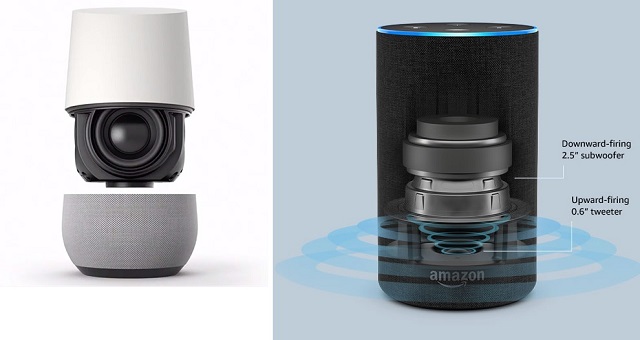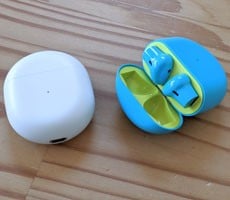Amazon and
Google are massive tech giants, for vastly different reasons. Google is the leading search engine provider, a
smartphone platform juggernaut, and huge advertising machine, while Amazon is the largest e-tailer in the world and a cloud services powerhouse, though Google is coming up strong. Though they are different animals, these two companies find themselves locked in heated battle with their respective
Google Home and
Amazon Echo devices; a battle for
AI dominance that could determine who will ultimately control a good chunk of the
Smart Home market.
The Smart Home market has massive growth potential over the next decade and it's an area that Google wants to own. We all remember how late Microsoft was to the modern smartphone market and how Apple and Google walked all over Windows Phone, despite Windows Mobile blazing a trail years earlier. A similar fate could be in store for late arrivals to the Smart Home arena, but unlike Microsoft's Windows Phone efforts, Google and Amazon are making a strong early push to ensure they aren't left behind.
Smart Home speakers are gaining in popularity every day, and for good reason. They interface with numerous devices in your home and offer a myriad of useful features. They can also provide hours of entertainment via services like
Spotify, and this is just scratching the surface. The list of things Smart Speakers can do is increasing daily. Amazon was first to the market with a successful device though, so Google is playing a bit of catch up here.
Of course, not all battles are won with smart technology alone, so we will be testing the second generation Amazon Echo and the Google Home for audio quality, ease of use, 3rd party support, cost, while considering the overall experience and future potential. In total, we spent close to a month with both devices, just long enough to see which one would be going home before the return period. You'll have to read ahead to see which one of these smart assistant-powered systems staying in our office, but we will tell you both put up a good fight and are a great first step to a smarter, more connected and entertaining home environment.
Aesthetics:
In our opinion, both of these products are visually appealing and designed to fit into any home decor, but they take a slightly different approaches. The
Google Home was fashioned to look like a wine glass, or a candle, according to Google. As for the Amazon Echo, well the best we can can tell it was designed to look like a cylindrical Bluetooth speaker. If we are being completely honest, however, it does remind us of a Fosters beer can. It's roughly the same size, so if you're a fan of Fosters, the
Echo will feel right at home. While the Echo may look like a beer can, in all fairness, the Google Home resembles a Glade air freshener to us, to be honest. That may or may not smell right to you.
To tweak their aesthetics, both the Google Home and Amazon Echo have six shells you can choose from. In Google's case, there are six colors available, while Amazon offers different finishes for the echo that consist of three material types, two wood options, and a metallic option. In addition to the shells, both feature touch controls on the top of the device. The touch options on the Amazon Echo consist of 4 physical buttons that allow the volume to be increased, or decreased, and there's mic mute and action buttons as well. The Google Home, on the other hand, uses a touch pad that allows the volume to be controlled by circling your finger across the top. The only physical button on Google Home is the mute button, which is found on the back of the device.
Aesthetics Winner: Google Home
Sound Quality:
Sound quality is probably the one aspect we tested more than any other. We listened to music for hours on end and while both speakers were capable of producing quality audio considering their small form factors, one was definitely better than the other. First lets look at the type of speaker drivers being used. The Amazon Echo has a downward facing 2.5-inch subwoofer and upward facing 0.6-inch tweeter, giving it omidirectional sound. In comparison, the Google Home has a front facing 2-inch driver with dual 2-inch passive radiators. The radiator design will work well with Home's small enclosure because the radiators will absorb a good deal of the actual speakers air pressure, reducing the movement of the driver and emitting additional sound. In turn, the passive radiators eliminate the need for a large port to vent air. The end result is the 2-inch driver is able to deliver better highs and lows that it would all on its own in a small enclosure.
While both speakers sounded adequate and could fill a medium sized room with sound, the Amazon Echo 2nd Gen offered a better listening experience. The highs and lows of the new speaker were tighter and it also seemed to hit those notes with more clarity. The omnidirectional design helped as well, because the speaker's positioning in comparison to the listener isn't as important as a standard speaker. Instead of sending a sound wave in one direction, it fills a room with sound in all directions. The Home's speaker did sound nice as well and also had no issues filling a medium sized room with decent audio playback. Google's sound overall was a little more natural than the Echo's because the highs and lows weren't as pronounced, but it just sounded a touch thinner and lacked some depth.
Audio Fidelity Winner: Amazon Echo 2nd Gen
AI:
We know we could be voluntarily building
Skynet by inviting Smart Speakers into our lab and letting them send every word we say back to Google and Amazon, in an effort to further improve their AI. However, in our defense, it's probably going to happen anyway, so we might as well just sit back and enjoy the perks of being able to turn our lights on with a simple voice command, before we descend into an apocalyptic, machine-controlled hell. And let's face it, current AI isn't truly scary (yet). Just don't ask Google Home if you're friends, the sarcasm in its voice is evident. On the same note, don't ask Alexa to talk to Home. She gives the cold shoulder, while Home is more than happy to spark up a conversation with Alexa.
Thoughts of our future overlords aside, both Amazon Echo and Google Home have decent (we use that word lightly)
AI, but it becomes quickly evident which one has a massive search database to call upon. Google Home is just easier to talk to. You don't have to carefully phase your sentences, or debate if you can ask a follow up question, because it offers better natural speech recognition. The responses compared to the Echo are also much better. Part of the reason being is Home uses Google as its search engine (of course), while the Echo uses
Bing. When you ask Echo's
Alexa assistant a question, it is so heavily reliant on Wikipedia that 6 out of 10 questions we asked netted a Wikipedia response. The other 4 didn't necessarily come from another source either. With Alexa you quickly get used to hearing her "Hum, I don't Know." response. Google Home of course couldn't answer some of our questions as well, and it also used
Wikipedia on more than one occasion. It just wasn't as heavily reliant on it, and at times it came back with an answer Alexa just couldn't find.
Up to this point both devices seem similar, but at some point you will find you're not dealing with two machines vying for the exact same job. Both can play music, connect to Smart Home devices and make phone calls. However, being designed by two vastly different companies, they are simply not the same. When it comes to online shopping, Amazons's Echo is hands down the winner, as you might imagine. You can order anything from Amazon with a simple voice command, using Prime. After that, the said product will not only be ordered by Alexa, it will also track it step-by-step from warehouse to your door. Giving you updates along the way. Google Home can't do this. It just doesn't have the e-commerce background to pull from. Instead you can shop from a handful of stores that include Target,
Walmart and Sam's Club. Having the resources Amazon has also gets passed down to the consumer. Features such as Amazon Music Unlimited are far cheaper than Google's alternative. A yearly subscription to Music Unlimited is only $47.88 USD, compared to the $119.88 USD
Google Music costs.
Another aspect that differs from the two Smart Speakers is how they perform tasks. when dealing with Alexa if you want to add new features you have to add a "Skill" via the Amazon Alexa App. In total there are over 30,000 "Skills" available that range from the down right silly to the absolutely necessary. Some of the more
out there "
Skills" are Animal Yoga and Don't Cut That Wire. Those are just for fun, the Skills that most of use will use include Smart Home lights and outlet control, and your preference on news and sports. Google Home doesn't call their features "Skills" but they are essentially handled in a similar way in the Google Home App. Currently Google doesn't have as many options as the Echo, but that's often what happens when when a product isn't first to market.
As far as AI voices go, Google offers both a male and a female voice. While the Amazon Echo currently only has a single female voice. Both are working on adding more voices, so maybe one day we can all be barking commands to J.A.R.V.I.S.. The voice of Google Home also seems more natural, while Alexa is a touch more robotic. The future of Home's AI is much more exciting as well. Just imagine
Google's Duplex AI system integrated into their Smart Speaker. Calls for basic errands such as setting up a restaurant reservation, or a doctors appointment could be a thing of the past. While that is in the future, Google still offers more in the way of search results and better voice recognition. Amazon has them soundly beat when it comes to ordering online though.
AI Winner: Slight Edge Goes To Google Home
Smart Home:
Interfacing with Smart Home devices has been one of the most rewarding parts of owning a Smart Speaker for me, personally. Nearly all of the lights in our house are now either Smart Lights, or connected to a Smart Plug. This means we can simply ask for any given room's lights to be turned on before we even step foot in that room. We can also stream music to a room we are going to be in and tell it all to turn off as we leave. It's liberating and simply put, fun.
Up until recently,
Amazon Echo had
Google Home beat on 3rd party Smart Home support. Google is quickly catching up though, and they are now supported by over 1,500 home control devices. Impressive, considering they started with just the big 4 a couple of years ago. However, the Amazon Echo still has a larger ecosystem of Smart Home products, so some things that work with Alexa will not work with Home. The gap is quickly narrowing though. Case in point -- the TP-Link Smart Plug. We bought one of these smart plugs, and the only device listed on the box as supported was the Echo, but Google Home found it and was able to connect just as easily as the Echo. Still, Amazon has an edge here because they were first to market and they have been able to create more connections and make good use of their head start. Google is nipping at their heals though.
Smart Home Control Winner: Amazon Echo 2nd Gen
Microphone:
The new Amazon Echo 2nd Gen device features seven microphones that use Far-Field beamforming technology and enhanced noise cancellation and better pick up audio cues. This is a big improvement over the last gen Smart Speaker and the investment paid off, for the most part. Both the Echo and Home could hear our commands from as far as 30 feet away, but there were exceptions.
Google could hear us even if we were speaking through multiple walls, whereas the Echo usually couldn't. However, the Echo seemed more likely to hear us in noisy environments, for example if it was playing loud music. Regardless, while both have exceptional listening skills from a distance, both still need work as well.
Microphone Winner: Virtual Tie
Phone Calls:
Making phone calls from your Smart Speaker sounds like a convenient way to stay connected with friends, family and business contacts, but our experience left a lot to be desired. In order to make calls from your device, first you need to give the Smart Speaker access to your contacts and from there you can call any listed number. In our testing though, conversations didn't always go well. During our testing, both devices made voices sounds robotic, they both dropped calls, and created a fair amount of echo. There were times the call was clear on both ends, but that was few and far between. It's a great feature in theory, but in our experience, making calls was frustrating at best. On the up side, the calling feature is free and will likely be improved in future updates.
Speakerphone Calling Winner: Tie And Both Are Kind Of Weak Sauce Currently
Pricing:
Currently, the Amazon
Echo 2nd Gen Smart Speaker costs $99 USD, while
Google Home costs $129 USD. With the current pricing it's hard to recommend the Google Home over the Echo considering they both support many of the same devices, have many of the same features, and both sound quality issues. The Google Home also feels more like a long-term investment that needs some time to mature versus the 2nd Gen Echo. While the Google Home hasn't nearly been on the market for as long as the Echo, it has nearly caught up with Amazon in a number of ways, however. The only real gap that won't be bridged anytime soon is shopping via voice commands.
Cost Winner: Amazon Echo 2nd Gen
The Final Verdict - A Slight Nod To Google Home

It's time to tally up the scores here. It was a good fight and both devices remained standing as we headed into the final round, but only the winner can stay, while the loser gets returned and shipped back to the store, in this case. In total Amazon's Echo won three rounds, while Google Home took two, and there were two ties. While Amazon did score more points, in terms of the overall experience and future outlook, it's our opinion the two are simply locked in dead heat, depending on your use case and lifestyle.
Both do what they are designed for reasonably well for being relatively new technologies and choosing one over the other will come down to your particular needs. If you do a lot of online shopping, the
Echo is the smart choice. It offers a far better shopping experience and it's $30 cheaper to boot. Google Home won't wow you with its shopping options, but it's a bit more natural sounding and offers many of the same features found in the Echo. Impressive, considering it hit the market nearly 2 years after the original Echo was first launched. It's our opinion that
Google Home will become the more exciting device down the road, with features such a Google Duplex on the horizon, but currently both devices are too similar to definitively pick one over the other.
From the start we said one of these Smart Speakers would be getting returned, and after thinking it over and agonizing over small aspect of the user experience, we decided to send the Echo back to Amazon. The Google Home struck us as more user friendly and the features Google has planned for its assistant are simply more enticing.













